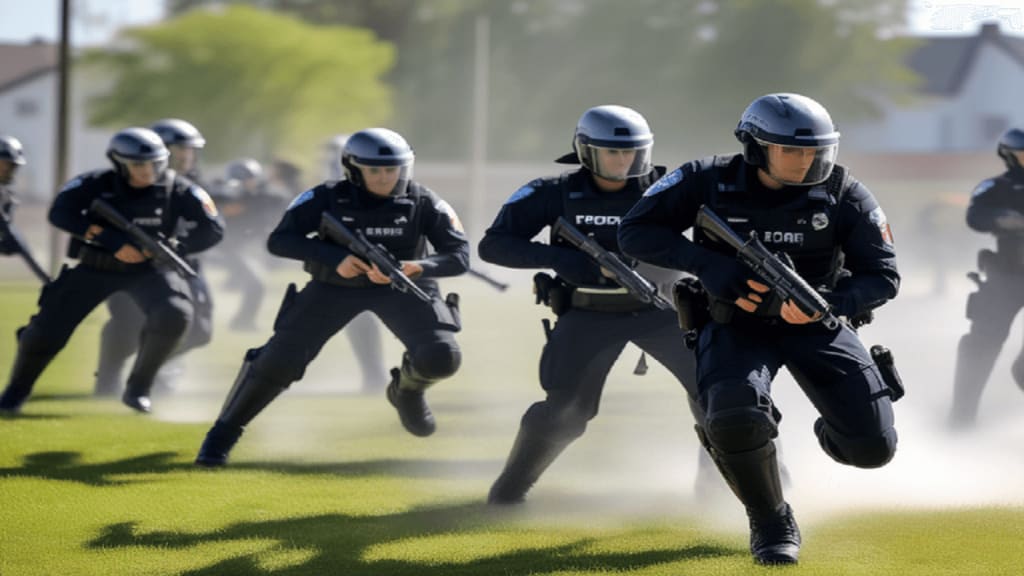Training Comparison: German Police vs. USA Police Officers
An In-depth Analysis of Training Approaches: Contrasting German Police and USA Police Officer Training Programs

Law enforcement agencies worldwide undergo rigorous training to uphold safety and justice within their respective communities. However, the training structures and approaches for German and American police officers showcase distinct methodologies and ideologies. In this Blog, we will read about how the training of German police officers compares to that of police officers in the USA.
Training Structure in German Police
Requirements and Entry Process
Aspiring police officers in Germany must go through a tough screening procedure that involves background checks, psychological exams, and physical fitness assessments. After completing a three-year academic and practical training program, high school graduates are eligible to apply.
Curriculum and Duration
The training curriculum in Germany covers legal studies, criminal law, social sciences, and practical police work. It encompasses classroom learning, scenario-based exercises, and internships, lasting approximately three years.
Practical Training
German police training heavily emphasizes practical application. Trainees engage in real-life simulations, crisis management scenarios, and internships, fostering hands-on experience in diverse situations.
Training Structure in US Police
Entry Requirements and Selection Process
In the United States, entry requirements vary by state and agency. Generally, candidates need a high school diploma or equivalent, passing a written exam, physical fitness test, and background investigation. In a written exam they face the police interview questions after that they go for the next round.
Academy Curriculum and Duration
Classroom teaching, firearms training, and physical conditioning are all combined in US police academies. The course covers law, ethics, de-escalation techniques, and firearms competency and lasts anything from a few months to a year.
Field Training
Following academy graduation, new officers in the USA undergo field training with experienced officers, applying theoretical knowledge to real-world scenarios.
Comparing Curriculum and Focus
Legal Education
German police training places significant emphasis on legal education, ensuring officers possess a comprehensive understanding of laws and regulations.
Use of Force Training
US police training often includes extensive use-of-force training, focusing on firearms proficiency and decision-making in high-stress situations.
Community Engagement
German police training prioritizes community-oriented policing, fostering strong relationships between officers and citizens.
Training Techniques and Approaches
Hands-On Learning in Germany
German police training emphasizes hands-on learning, allowing trainees to develop practical skills through simulations and real-world experiences.
Emphasis on Scenario-based Training in the USA
US police training frequently involves scenario-based exercises, simulating various incidents to enhance decision-making and crisis-management skills.
Cultural and Societal Influences
Impact on Training Approaches
Cultural and societal factors shape training approaches, with Germany focusing on social integration and the US highlighting individual accountability.
Diversity and Inclusion Training
Both countries increasingly incorporate diversity and inclusion training to address societal changes and promote sensitivity in policing.
Outcome and Performance Comparison
Crime Rates and Public Perception
Germany's lower crime rates can be attributed to a multifaceted approach, combining community-oriented policing strategies with a focus on strong social integration. Community-oriented policing emphasizes collaboration between law enforcement and the community, fostering trust and communication. This approach aims to address root causes of crime, prevent its occurrence, and build a safer environment.
The strong emphasis on social integration in Germany plays a crucial role in crime prevention. The country's comprehensive social welfare system, education programs, and healthcare services contribute to a more inclusive society, reducing the risk factors associated with criminal behavior. Additionally, Germany's commitment to rehabilitation and reintegration for offenders contributes to a lower recidivism rate.
Officer Performance and Accountability
US policing grapples with ongoing challenges related to officer conduct and accountability, impacting public trust. Instances of misconduct, use of force controversies, and a perceived lack of accountability have led to increased scrutiny. Addressing these issues is crucial for rebuilding trust and fostering positive community relations within the American law enforcement system.
Conclusion
The training of German police officers, with its extensive theoretical groundwork and hands-on practicality, differs notably from the US approach, emphasizing diverse techniques and cultural adaptations. Each system reflects its unique societal values and aims to equip officers with the skills necessary to serve their communities effectively.
About the Creator
Best Interview Question
Best interview questions with answers will help you to succeed in job interview. Top Tips and tricks with sample answers, your overall guide for accomplishment






Comments
Best Interview Question is not accepting comments at the moment
Want to show your support? Send them a one-off tip.